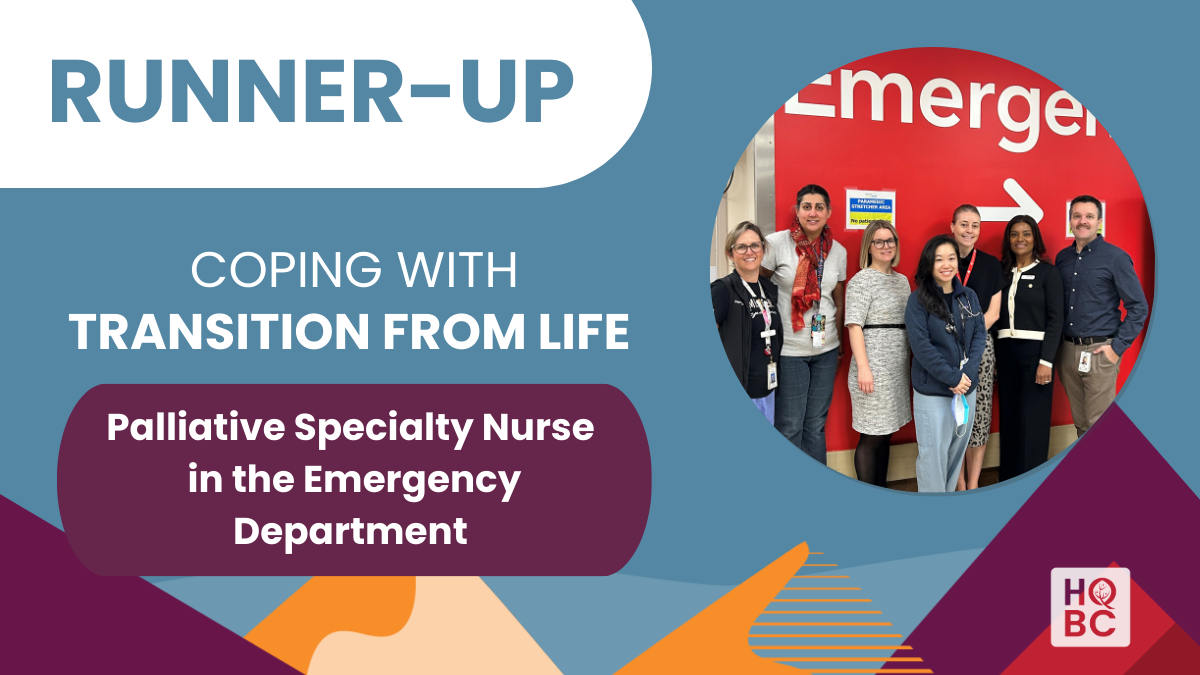- 2025
|
- Runner-Up
|
- Coping with Transition from Life
Due to an aging and increasing medically complex population (Naik et al., 2024), more patients present to emergency departments (ED) within their last months of life. In fact, one study concluded that 75% of patients visited the ED in their last six months of life (Smith et al., 2012). Adults with serious illness or life-limiting conditions have been shown to benefit from an earlier approach to palliative care (Temel et al., 2020). The ED, however, remains a challenging place to provide a palliative approach to care due to numerous factors including staff turnover, vast breadth of specialty knowledge expected of ED staff, limited time and competing demands. This project posited the question – what if we could improve provision of a palliative approach in EDs via a QI initiative embedding a palliative specialty nurse within the ED environment?
This QI project trialed this idea by having a Palliative Clinical Nurse Specialist (CNS) dedicate 1 hour a day, Monday to Friday, to support Vancouver General Hospital ED by proactively identifying patients with palliative needs, initiating earlier palliative consults, connecting patients with palliative home supports or community referrals, facilitating goals of care conversations, assisting with direct ED to hospice referrals and providing at-the-elbow support for symptom management and end-of-life care. From May to December 2023, 272 potential patients were identified and of these the CNS had capacity to work with 116. Patients were identified based on clinical judgement and use of validated screening tools such as SPICT and GSF-PIG and could be broadly categorized within the following groups: metastatic cancer, end-stage organ failures, end-stage frailty, end of life or previously known to palliative teams.
Feedback from ED staff has been positive. One ED nurse commented, “This role has benefited many patients by having conversations early in their ED visit around goals of care and taking the time to explain what different levels of interventions mean. Involving the family and incorporating patient-centred care and understanding what the patient wants. Shorter stays for patients in ED and get to the appropriate care space. Huge support for new staff in the department for end of life conversations, pain management, etc.”
Noteworthy outcomes include preventing acute admissions when patients preferred to be at home or in hospice and facilitating exploration of patients’ goals. In fact, due to this project 22 acute admissions were prevented between May to December 2023, which is not only representative of patient-centred care by supporting patients in their preferred location, but also an estimated savings to the acute system of approximately 230 bed days and $680,000. Please note that this analysis does not account for costs of community supports or hospice beds and this will be incorporated as this project continues.
This initial PDSA cycle served to quantify the palliative care need in the ED and validated the impact of a palliative specialist embedded in the ED environment. Given this early success, we were able to advocate to increase support to a Transitions Palliative Care Resource Nurse (PCRN) available Monday to Friday, 0730-1500 and this role was in place from December 2023 to August 2024. At present PDSA cycles and data collection for this project are ongoing. An instance of spontaneous feedback from family members of a patient that was received via a community colleague detailed gratitude “for the support that you and the social worker in ER provided to their mother in getting the forms in place and making the connection to community services.” Please note, this project would not have been possible without the collaboration and support of the following teams: VGH Palliative Care, VGH Emergency Department leadership and staff, Vancouver Community Palliative and VGH EDiCare team with their CML/TST counterparts.


